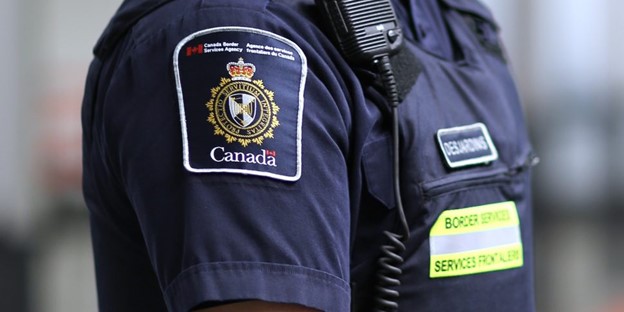
The Canada Border Services Agency
FRENCH – Agence des services frontaliers du Canada (ASFC)
SPANISH – La Agencia de Servicios Fronterizos de Canadá (ASFC)
CBSA was created on December 12, 2003, when the Auditor General of Canada, in an attempt to address certain issues that were under review, including the deficiency of exchanging information with a certain level of security and other deficiencies in the inter-institutional communication, formalized it in the Canada Border Services Agency Act, and the Agency was created, whose actual Royal Assent was given on November 3, 2005.
On July 6, 2010, the CBSA was awarded with its own official symbols, a shield and a heraldic insignia by the Canadian Heraldic Authority. The opening ceremony was the last performance Her Majesty Queen Elizabeth II attended as part of a Royal Tour through Canada in 2010. The ceremony was also attended by Governor General Michaelle Jean and Prime Minister Stephen Harper.
Its functions
The Legal Responsibilities and regulations that the Agency has under its control are:
- To manage the legislation that rules the admissibility of people and goods, plants and animals in and out of Canada.
- The application of trade remedies that help to protect the Canadian industry from the injurious effects of dumping (In economics, dumping refers to the practice of selling at prices below cost) and subsidies on imported products.
- To prevent the entry or exit of illegal goods.
- To promote Canadian companies and their economic benefits through the administration of trade legislation and trade agreements, complying with Canada’s international obligations.
- Detain those people who may pose a threat to Canada.
- The protection of food safety, plant and animal control and the basic resources of Canada.
- The administration of a fair and impartial reparation mechanism.
- To collect the duties and taxes that apply to imported merchandise.
- To promote Canadian interests in various international forums and international organizations.
- To allow entry of eligible migrants and refugees to Canada
- To prevent entry to people who are not admissible to Canada, including those involved in terrorist activities, organized crime, war crimes or crimes against humanity.
The control of the gateway to Canada, performed by the CBSA, is a key role in immigration control and enforces the mandate previously carried out by the Department of Immigration, Refugees and Citizenship of Canada. It detains and deports people who illegally enter or are in Canada.
At the end of 2003 there were more than 200,000 illegal immigrants in Canada, most of them in Ontario. Many of these cases are asylum seekers rejected by the Immigration and Refugee Board of Canada and who then remained irregularly in Canada.
The evaluations that are done in Canadian Customs can be very simple, two or three questions, but depending on your answers, attitudes and non-verbal communication, they can be the cause of a more in-depth review, such as a vehicle search, traveler’s luggage and possibly, more questions.
At this gateway, all people and their belongings are subject to being checked by CBSA agents. The officer must ensure the compliance with customs and immigration legislation.
Certain authority, under the Customs Act and the Immigration and Refugee Protection Act, has been delegated to CBSA officers. On the other hand, these officers can also enforce other Parliament laws, as they are appointed as Peace Officers under the Canadian Criminal Code.

